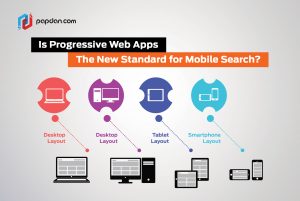In the early days, Google has predicted that the world is going to be more mobile. Therefore, they invested heavily to create and promote new method and technology that can deliver a better mobile web search experience. The main idea is to create fast, reliable, and engaging app-like experience via mobile browser. So, if you are a web developer or SEO analyst, this article will help your web works better on mobile.
How Does It Work?
Progressive Web Apps (PWAs) are designed to load “instantly”. They use routing browser through a script, better known as a Service Worker. The script eliminates steps otherwise required to access certain features or information directly from a website. PWAs also use more parameters, examining user behaviors and preference. As the result, the app can deliver personalized messages or webpage content likely to be of interest to a defined user persona.
Moreover, it locates an entire web page to a user’s local storage and places it in an app shell. Your content will only be updated as needed. A “Service Worker” serves all CSS stylesheets, images, JavaScript, pages, etc. It delivers blazing fast performance because most everything needed to render a page is stored locally.
PWAs can be accessed from a browser, no need for downloading or installation involved. Progressive Web Apps, published online, are completely linkable. Moreover, you still can have it works offline, utilizing cached data saved from previous online activity. In fact, many people predict that PWAs might replace the current generation of mobile websites.
Progressive Web App Checklist
Google has put together a set of minimum standards, which they refer to as the baseline, for creating a PWA. There is also a Chrome extension to validate compliance. The checklist mandates:
- Site is served over HTTPS
- Pages are responsive on tablets & mobile devices
- The start URL (at least) loads while offline
- Metadata provided for Add to Home screen
- First load fast, even on 3G
- Site works cross-browser
- Page transitions don’t feel like they block on the network
- Each page has a URL
Advantages of Progressive Web Apps
The following are some of the key benefits of PWAs:
- No Hardware Restrictions
- Works like a Native Mobile App
- Improved performance
- Push Notification
Implications for SEO
It stands to reason that PWAs could now get favorable treatment in the SERPs IF they are both index able and linkable, with the introduction of the mobile first index. Furthermore, these pages will be crawled the same as JavaScript or Ajax. Google has provided developers with a set of best practices to accomplish this. Besides, we also provide another punch list to ensure that all bases are covered. This checklist explains both why and how to:
- Make your content crawl able
- Provide clean URLs
- Specify Canonical URLs
- Design for multiple devices
- Develop iteratively
- Use progressive enhancement
- Test with Search Console
- Annotate with Open Graph & Twitter Cards
- Test with multiple browsers
- Measure page load performance
One of among so many successful stories that use PWAs is Flipkart. Flipkart is India’s largest e-commerce site. Another example is the Washington Post, owned by Jeff Bezos, founder of Amazon.com where they publish over 1000 articles daily.

